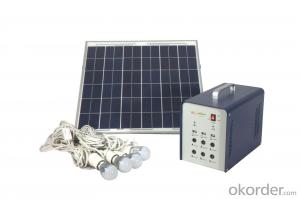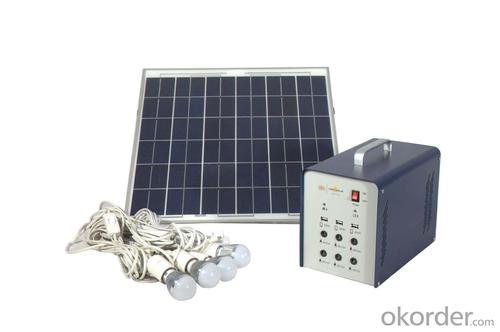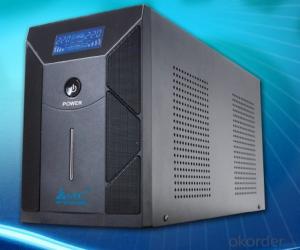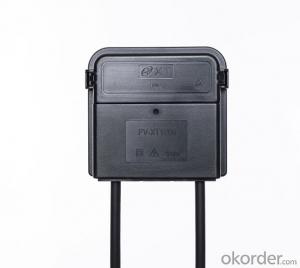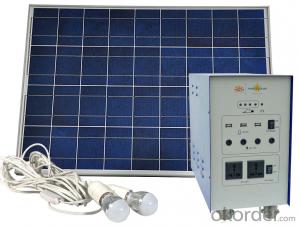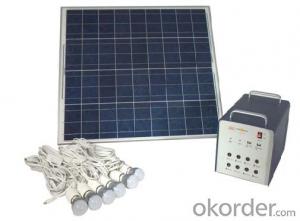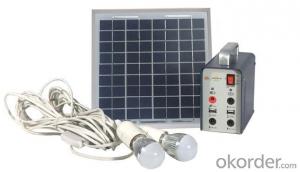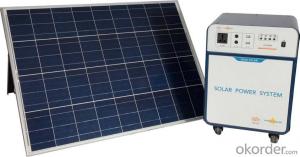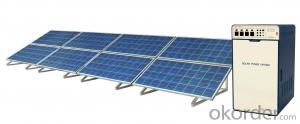Solar Energy Systems in Madurai - Home Off-Grid Solar Power System DC Lighting JS-SPS-200C
- Loading Port:
- Tianjin
- Payment Terms:
- TT OR LC
- Min Order Qty:
- 10 set
- Supply Capability:
- 10000 set/month
OKorder Service Pledge
Quality Product, Order Online Tracking, Timely Delivery
OKorder Financial Service
Credit Rating, Credit Services, Credit Purchasing
You Might Also Like
Off-grid Solar Power System
General Introduction
Solar power system provides alternating current and direct current, which is produced by the modules transforming solar power into power, to home lighting, household appliance and other DC appliance, such as cell phone and laptop.
Solar power system is widely used in area lack of power, for example house power supplying, monitoring, communication base, fire prevention in forest area, pasture and meadow, aquaculture etc.
We are dedicated to provide high quality off-grid PV products and systems to customers and has received a series of certificate, including ISO9001, TUV, UL, CE, CQC and RoHS.
Solar DC Lighting System
Multiple protection system, safe and reliable performance.
Integrated and portable design, easy operation.
DC5V, DC12V, AC220V output, wide range application.
Clean engergy, cycle use.
General Introduction
Solar power system provides alternating current and direct current, which is produced by the modules transforming solar power into power, to home lighting, household appliance and other DC appliance, such as cell phone and laptop.
Solar power system is widely used in area lack of power, for example house power supplying, monitoring, communication base, fire prevention in forest area, pasture and meadow, aquaculture etc.
We are dedicated to provide high quality off-grid PV products and systems to customers and has received a series of certificate, including ISO9001, TUV, UL, CE, CQC and RoHS.
Solar DC Lighting System
Multiple protection system, safe and reliable performance.
Integrated and portable design, easy operation.
DC5V, DC12V, AC220V output, wide range application.
Clean engergy, cycle use.
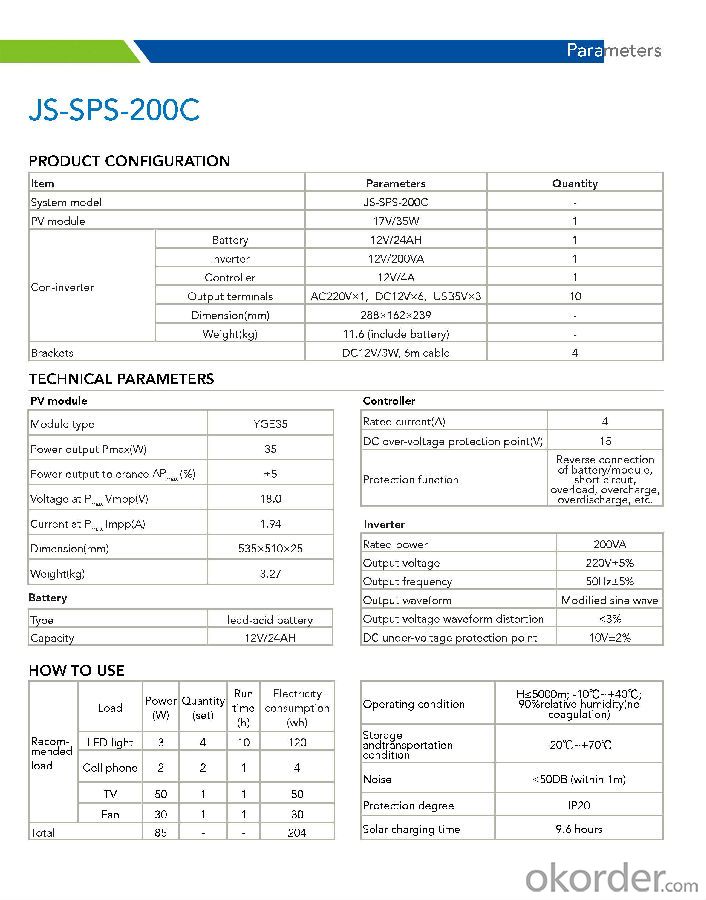
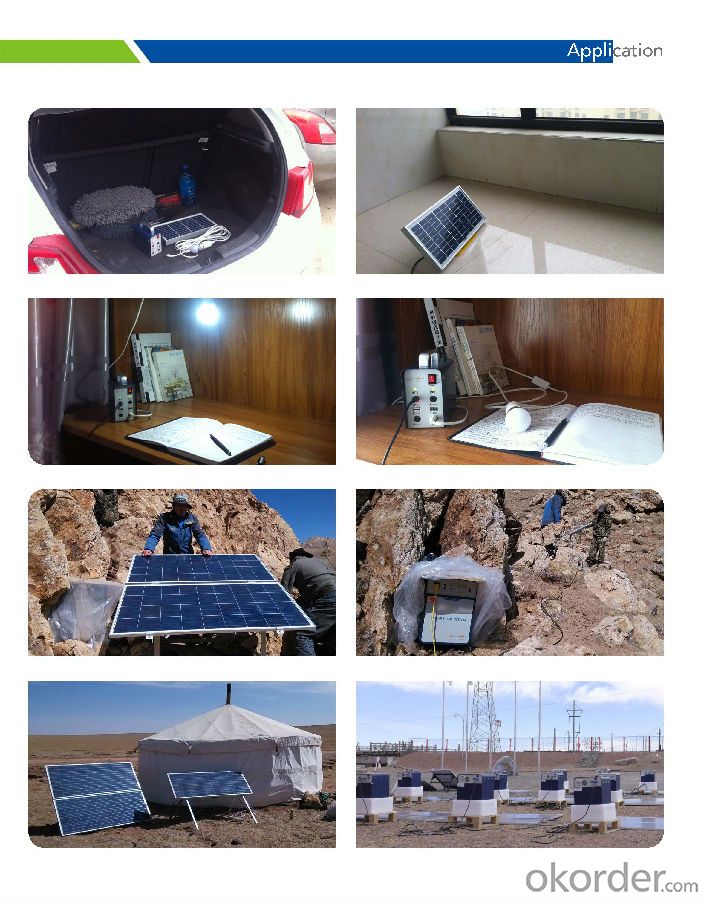

- Q: Can solar energy systems be used in powering agricultural processing facilities?
- Solar energy systems have the capability to power agricultural processing facilities. Photovoltaic (PV) panels, for instance, are able to generate electricity by harnessing sunlight. This generated electricity can then be utilized to operate various electrical equipment and processes within agricultural processing facilities. This includes the ability to power machinery used for cleaning, sorting, and packaging agricultural products, as well as running heating, ventilation, and air conditioning systems. To ensure a consistent and uninterrupted power supply, solar energy systems can also be combined with battery storage solutions. This integration allows for a reliable power supply, even during periods of limited sunlight or during nighttime. Furthermore, employing solar energy to power agricultural processing facilities helps decrease dependence on fossil fuels, reduces greenhouse gas emissions, and contributes to a more sustainable and environmentally friendly operation.
- Q: How do solar energy systems impact energy resilience during natural disasters?
- Solar energy systems can greatly enhance energy resilience during natural disasters. Unlike traditional power grids that rely on fossil fuels, solar energy systems generate electricity from sunlight, making them more reliable and less vulnerable to disruptions caused by extreme weather events. During power outages, solar panels can continue to produce electricity, providing a reliable source of energy for critical infrastructure, emergency services, and households. Additionally, solar energy systems can be combined with energy storage solutions such as batteries, allowing excess energy to be stored and used when the sun is not shining, further increasing energy resilience. Overall, solar energy systems play a crucial role in ensuring a more resilient and sustainable energy infrastructure during natural disasters.
- Q: Can solar energy systems be used in powering scientific research vessels or marine laboratories?
- Indeed, it is possible to utilize solar energy systems for the purpose of powering scientific research vessels or marine laboratories. Solar energy, being a renewable and sustainable power source, can be harnessed through the utilization of photovoltaic panels or solar thermal collectors. The energy requirements of research vessels and marine laboratories are substantial, given the nature of their operations which involve scientific experiments, data collection, and analysis. These activities usually involve the use of equipment like computers, sensors, and laboratory instruments, which necessitate a continuous and dependable power supply. To address this need, solar energy systems can be installed on said vessels or laboratories, providing a clean and efficient source of electricity. Through the conversion of sunlight into electricity via photovoltaic panels, the various equipment and systems on board can be powered. Moreover, any excess energy produced by the solar panels can be stored in batteries to be utilized during periods of decreased sunlight or at night. The utilization of solar energy in these marine environments presents numerous advantages. Firstly, it diminishes reliance on fossil fuels and diminishes the carbon footprint associated with conventional methods of power generation. This is particularly vital in the context of scientific research as it aligns with the principles of environmental sustainability and conservation. Secondly, solar energy systems offer a reliable and autonomous power source. Research vessels and marine laboratories often operate in remote or secluded locations where access to traditional power grids may be limited or non-existent. By harnessing solar energy, these vessels and facilities can generate their own electricity, enabling them to continue their research activities without depending on external power sources. Lastly, solar energy systems necessitate minimal maintenance and have a lengthy lifespan. Once installed, they require minimal upkeep and are capable of withstanding the harsh marine environment. This makes them highly suitable for use in research vessels or marine laboratories, where downtime and maintenance issues can be disruptive to ongoing scientific projects. In conclusion, there is no doubt that solar energy systems can be effectively employed to power scientific research vessels or marine laboratories. They offer a sustainable, reliable, and autonomous source of electricity, thereby reducing the carbon footprint and ensuring uninterrupted research activities, even in remote locations.
- Q: How does the age of a solar energy system affect its performance?
- The age of a solar energy system can affect its performance in several ways. Over time, the efficiency of solar panels can decrease due to wear and tear, resulting in a decrease in power output. Additionally, older systems may not have the same technological advancements and improvements that newer systems possess, leading to lower overall performance. Regular maintenance and monitoring can help mitigate some of these effects, but generally, the age of a solar energy system can have a negative impact on its performance.
- Q: What is the impact of temperature on the efficiency of a solar energy system?
- The temperature greatly affects the efficiency of a solar energy system. As the temperature rises, the efficiency of solar panels decreases. This is because of how the semiconductor materials used in solar cells behave. When solar panels are exposed to sunlight, they absorb photons and convert them into electricity. However, as the temperature increases, the resistance of the semiconductor material also increases, which leads to a decrease in the flow of current. This phenomenon is called the temperature coefficient of power. The temperature coefficient of power is usually expressed as a percentage per degree Celsius and varies depending on the type of solar panel technology. Most solar panels have a negative temperature coefficient, meaning their efficiency decreases as the temperature rises. On average, solar panel efficiency can decrease by around 0.5% to 0.8% for every degree Celsius increase in temperature. Moreover, increased temperatures can cause thermal losses within the system. The heat can accumulate in the solar panels, further reducing their efficiency. This is particularly true in hot climates or when there is high solar irradiance. To address the impact of temperature on solar energy system efficiency, various strategies can be employed. One common approach is to incorporate cooling mechanisms, such as ventilation or water circulation, to dissipate the excess heat generated by the solar panels. This helps maintain lower operating temperatures and consequently improves overall efficiency. Furthermore, proper system design and installation techniques can also reduce temperature-related losses. For instance, mounting solar panels with sufficient spacing to allow for air circulation can prevent overheating. Additionally, choosing solar panels with lower temperature coefficients can help minimize efficiency losses in high-temperature environments. In conclusion, temperature significantly affects the efficiency of a solar energy system. Higher temperatures can cause a decrease in solar panel efficiency, mainly due to increased resistance in the semiconductor materials. To optimize the performance of solar energy systems, strategies like cooling mechanisms and proper system design should be implemented.
- Q: Can solar energy systems be used for powering outdoor signage?
- Yes, solar energy systems can definitely be used for powering outdoor signage. Solar panels can be installed on the signage structure to capture sunlight and convert it into electricity, which can then power the signage system. This offers a sustainable and environmentally friendly solution, reducing the need for traditional electricity sources and minimizing carbon emissions. Additionally, solar-powered outdoor signage can be installed in remote areas where access to electricity is limited or costly, making it a practical and efficient choice.
- Q: Are there any risks of electrical grounding issues with solar energy systems?
- Solar energy systems can pose several risks due to electrical grounding issues. One major risk is the potential for electric shock, which occurs when the grounding system is not correctly installed or maintained. This can cause a buildup of electrical current, leading to contact with live electrical components and subsequent shock. Another risk is the possibility of fire. When the grounding system is improperly installed, it can result in electrical arcing, which can ignite a fire. This is especially hazardous as solar energy systems are often situated on rooftops, making it easier for a fire to rapidly spread throughout the entire building. Furthermore, a faulty grounding system can cause damage to the solar energy system itself. Without proper grounding, electrical surges and fluctuations can occur, harming sensitive components like inverters and batteries. To mitigate these risks, it is essential to ensure the proper installation and regular inspection and maintenance of the grounding system in a solar energy system. This involves using appropriate grounding equipment like grounding rods or conductors, as well as ensuring all connections are secure and free from corrosion. Regular testing should also be carried out to assess the effectiveness of the grounding system. It is advisable to enlist the services of a qualified professional for the installation and maintenance of the grounding system to minimize the hazards associated with electrical grounding issues in solar energy systems.
- Q: Can a solar energy system be installed in a remote location without access to the electrical grid?
- Yes, a solar energy system can be installed in a remote location without access to the electrical grid. Solar power systems utilize photovoltaic (PV) panels to convert sunlight into electricity. These panels can be installed in areas with abundant sunlight even if they are far away from the electrical grid. In such cases, an off-grid solar energy system can be used. This system consists of solar panels, a battery bank, and an inverter. The solar panels collect sunlight and convert it into electrical energy. This energy is then stored in the battery bank for use at night or during cloudy days when sunlight is not readily available. The inverter is used to convert the stored DC (direct current) power from the batteries into AC (alternating current) power, which is the standard type of electricity used in homes and buildings. Off-grid solar systems are commonly used in remote locations such as cabins, campsites, and rural areas where connecting to the grid is not feasible or cost-effective. These systems provide a reliable and sustainable source of energy, reducing the dependence on traditional fossil fuel-based generators or other forms of energy. Furthermore, solar energy is a clean and renewable source, making it an environmentally friendly choice. While installing a solar energy system in a remote location without access to the electrical grid can be more challenging and expensive compared to grid-connected systems, the long-term benefits and energy independence make it a viable solution.
- Q: What is the lifespan of a solar energy system?
- The lifespan of a solar energy system typically ranges from 25 to 30 years, but with proper maintenance, it can last even longer.
- Q: Can solar panels be used to power streetlights?
- Yes, solar panels can be used to power streetlights. Solar panels can generate electricity from sunlight, which can then be stored in batteries or used directly to power streetlights during night-time. This is an efficient and environmentally-friendly way to provide illumination for streets and public spaces.
Send your message to us
Solar Energy Systems in Madurai - Home Off-Grid Solar Power System DC Lighting JS-SPS-200C
- Loading Port:
- Tianjin
- Payment Terms:
- TT OR LC
- Min Order Qty:
- 10 set
- Supply Capability:
- 10000 set/month
OKorder Service Pledge
Quality Product, Order Online Tracking, Timely Delivery
OKorder Financial Service
Credit Rating, Credit Services, Credit Purchasing
Similar products
Hot products
Hot Searches
Related keywords
